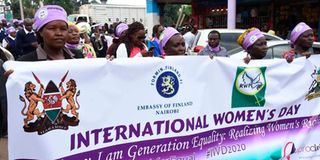Inclusion of women can no longer wait

Participants during a procession in Eldoret town, Uasin Gishu County, to commemorate the International Women’s Day on March 09, 2020.
What you need to know:
- The common justification for male domination is that tasks requiring physical activity cannot be done by women.
- This incorporates several untrue beliefs, such as that women lack “strength” or “stamina”.
International Women’s Day is a global moment for the world to consider the tragic contexts in which all women in the world live and work, in a world that is not optimised for their survival, let alone their success and progress.
The common justification for male domination is that tasks requiring physical activity cannot be done by women. This incorporates several untrue beliefs, such as that women lack “strength” or “stamina”. The presence of women in many physically demanding arenas says different.
There are also tasks that women are said to “refuse to do”. The truth is there have been active agendas to either prevent them from entering these fields or to phase women out of these fields once they become profitable. The story of the pioneer computer named Eniac, and the calculated ejection of women from the field of computing in the mid 20th century, is now a well known historical fact.
Present-day strategies for equality have now been framed as “attracting women” to different sectors as if the male domination within these sectors has been accidental. A common example is in science, tech, engineering, and math (Stem) fields. The root issues here have not been addressed, including the creation of hostile environments for women, not punishing abuse of women in the workplace, silencing discrimination of women, and more.
Vulnerable women
Times are changing, in a world where feminist activism and advocacy have taken root among the public who want better for themselves. In the same way that male-dominated fields are being challenged, it is important to interrogate what the areas of work left to women have in common. This can start in the home, by making sure that tasks are done by everyone as needed, not as gendered. Making house chores ordinary is a substantial part of undoing the gendered societal conditioning.
Additionally, the role of the family as an employer must be discussed openly. Domestic work and its pay are overlooked in labour union conversation, and doing so at the government level is long overdue. It is time labour unions actively represent the informal sector right from homes. They must rally the public to realise the value of, and support, domestic workers. Unions should focus on how to elevate the dignity and wage of domestic workers.
Another way of engaging with care work is by doing active research into women-dominated fields, with a view to ensuring income parity with other fields. The true cost of care work in any economy can be calculated and publicised so that society can begin engaging with this area of human endeavour from a point of value, as opposed to expecting it for free from women.
This international Women’s Day is, therefore, an opportunity for us to do a much-needed audit, and start working towards a fairer grassroots inclusion that allows us to make the most vulnerable women visible.
The work of including women must be continuous, deliberate and expansive, to progressively reduce the barriers that keep marginalising them.
The writer is a policy analyst. [email protected]





